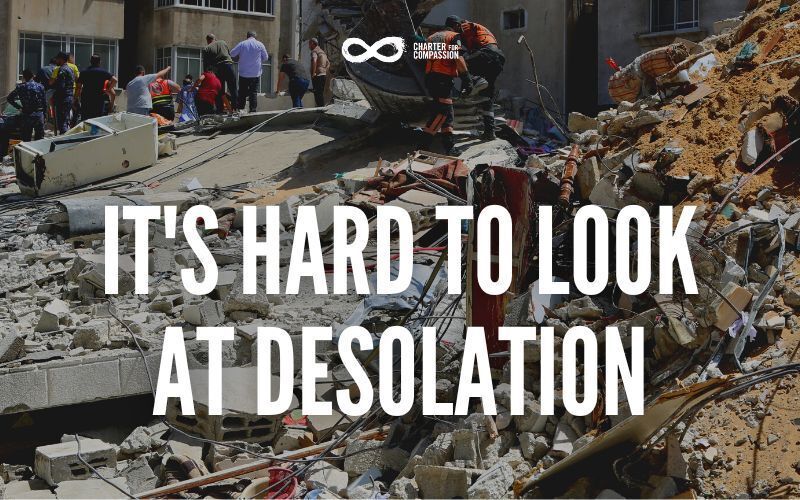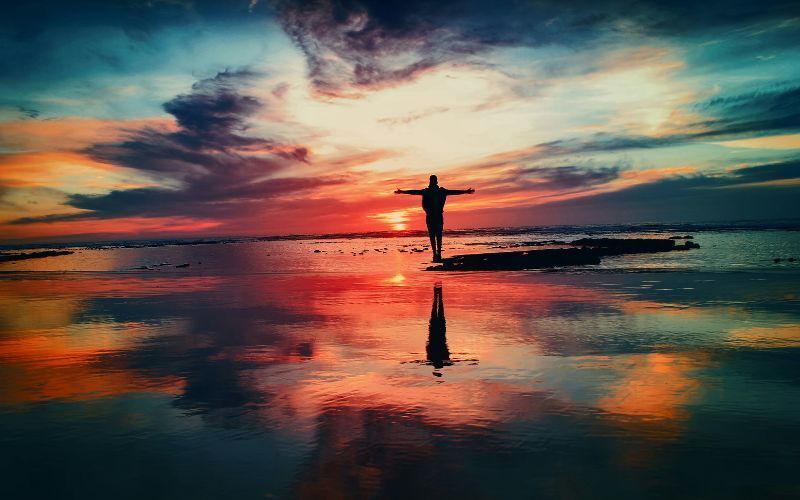
From Marilyn: Barbara Kaufmann is the lead for the Charter for Compassion's Art Sector. She is also a skilled writer and has a background as a medical professional. The response that follows is a reflection on last week's blog on the natural disaster that occurred in Syria and Turkey earlier this month. This entry was written on February 12, 2023. (death toll has severely increased since then.)

Thank you, Marilyn, for putting together the history and reminding us—in your blog post about Gaziantep, that yes, we are, and always have been—one. What happens there affects us here. What happens to humanity there, hurts our hearts here. Gazantiep is among our earliest Compassionate Cities, as was my city—Appleton, in Wisconsin. A sister city, if you will. We are Gazantiep.
The death toll from the earthquake stands now, almost a week, later, at 33,000, and there was a 4.6 aftershock today. This heaped upon a decade of war in Syria! Sixty percent of the infrastructure was already damaged before the earthquake. How much tragedy can be heaped upon a people without them completely collapsing? What more can occur that obliterates the human spirit? How much can a human being/s stand?
It's hard to look at desolation. We'd rather look away. The pain is too much. The human part in devastation is too deep. But if we are to become what this millennium demands—true global citizens, then we must bear witness. Even when the "looking on…" is filled with searing pain. The picture has changed. The neighborhood has expanded, no—exploded. We are all part of this messy experiment of being human. But are we becoming more human? Or should I say humans becoming more?
It's not happening to "them;" it is happening to "us." When I first saw the images from Turkey and Syria, I spontaneously and involuntarily burst into tears. As a writer with a medical background, I'm no stranger to compassion or empathy, but those fathoms of feeling are new for me. I am more convinced than ever that it all needs to become PERSONAL. It is no longer "I" or "my;" it is now "we" and "us." The world is no longer the expansive planet with vast unexplored regions we once knew; it is our vulnerable global home surrounded on all sides by death—the vast emptiness, the vacant terrain of uninhabitable space.
It's worth remembering the quote, "a child that is not embraced by its village will burn it down to feel its warmth." The origin of the proverb is unknown but often attributed to Africa, where yes, "it takes a village." Now, everywhere is a village. Earth herself is our village. The village has grown exponentially, and human problems are now soul-sized. We need to broaden our embrace. As we educate ourselves about the origins of life, LIFE seems evermore precious. And we are glimpsing the new vision described so well in Peter Mayer's haunting music and lyric "Everything is Holy Now." That includes us. And "them."
All of it is now "us" and "ours." Every species is our relative. Every species! That tree... That fox... That river... That human... Those people... they are mine. If we don't come together and treat it all as personal, treat "them" as family, we won't survive. The Earth will, but we will not be here. This is my planet, and I am obligated by my inheritance—the gift of life, to respect it by protecting it.
Many of us can't even fathom what living in such rubble of humanity means. It's humans that must persevere in such darkly desolate conditions, but it's not "human." And certainly not humane—that word derived from "human," that does not meet its definition of "compassionate and benevolent."
Compassion is about doing to others what they (and you) wish them to do or be done. As an American, I need to remember we have a super-volcano here in Yellowstone that is overdue for eruption so what is happening in Syria or far worse, could easily happen here. Would we be in need? Would we want people to respond? To help us? We humans like to ignore the painful, like to believe in magic or magical thinking, that we're insulated-- but none of us are. The earthquake doesn't know your name. It doesn't ignore your neighborhood. Wealth does not minimize the tragic. Nationalism and arrogance will not save us. Any of us. We need to leap beyond our arrogance and dethrone ourselves. Natural tragedy observes no borders. And if you look around and then back on Earth from the Webb telescope, there are no borders. There are no dividing lines. And the great unknown reduces us to the size of a pea in a vast ocean of space and a singular and exclusive laboratory for LIFE. We are a one-of-a-kind island. We are a workshop in progress. There are better ways for us to honor ourselves.
I challenge you to a ritual that I have been practicing… Go for a walk and as you walk look carefully at the features along your stroll. Caress everything with your eyes, your mind. Touch if you can. Include… that bush, that tree, that squirrel, that barking dog, even that landscape or expand even farther to embrace that building for it is a work of art,a person you pass or a group of kids on the playground and repeat to yourself silently: "You are my relative." "We are kin—entangled." "You are all my relations, my creations." Notice how your perspective changes. Notice how you change.
Then, be the change.


